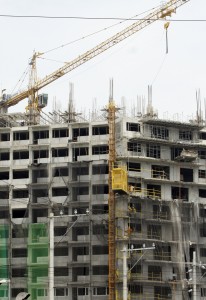Ecstatic Palace calls PH a ‘roaring lion of Asia’ over GDP growth
MANILA, Philippines — The Philippine economy “roared like a lion” in the third quarter in 2012, with the gross domestic product (GDP) growing by 7.1 percent, Malacañang officials said on Wednesday.
Palace executives said this expansion in the economy beat “government targets, besting other Southeast Asian economies” such as Indonesia’s 6.2 percent, Malaysia’s 5.2 percent, Vietnam’s 4.7 percent, Thailand’s 3 percent and Singapore’s 0.3 percent.
“This impressive expansion from 3.2 percent in the same quarter last year, places the country’s nine-month growth rate at 6.5 percent and on track to surpass the 5-6 percent full year growth target set by the National Economic Development Authority,” said presidential spokesperson Edwin Lacierda in a Palace briefing.
He later texted the Philippine Daily Inquirer, agreeing that the country under the Aquino watch could now be a “roaring lion of Asia.”
Contacted by phone, Budget Secretary Florencio Abad said as much, but quickly added: “Oh yes! And more to come.”
Article continues after this advertisementThe expansion in the economy reflected growth in public and private construction, manufacturing, household financial consumption expenditure and other sectors, except mining, said Lacierda.
Article continues after this advertisementLacierda attributed this economic leap to “sustained confidence in the leadership of President Benigno Aquino III and his administration, which has consistently equated good governance with good economics.”
“The Philippine economy has shown both resilience and resurgence despite the global economic slowdown,” he said, adding:
“Underscored by deft fiscal management, responsible and transparent public spending, and a continually strengthening partnership between government and business, this has resulted in a virtuous cycle for the Philippine economy.”
Lacierda admitted that much should be done so that growth would trickle down to poor, and that President Benigno Aquino III has committed to this goal.
“Equitable and inclusive growth is a commitment of the Aquino administration that has prioritized the establishment of both social and physical infrastructure, which continues to redound to a more robust economy for the benefit of all Filipinos,” said Lacierda.
“Government has also pushed to ensure this economic growth is felt by the broadest number of people,” he said, noting that within the same nine-month period this year, the Aquino administration enrolled more than three million beneficiaries under the Conditional Cash Transfer program and has “distributed P20 billion for this priority social investment.”
“On top of this, spending for public health has also increased, resulting in an expansion of health care safety nets and improvements in hospitals and health centers all over the country,” he said.
Asked about the impact of an expanding economy on the lives of the 94 million Filipinos, Lacierda cited the construction boom—both bankrolled by private and public investments—and expansion of the service sector as steady sources of stable jobs for Filipino workers.
These sectors, he said, had a trickle-down effect on the grassroots’ level.
“Well, you’ve got construction going. We’ve seen the public infrastructure that’s ongoing and also you see the private construction that’s ongoing,” he said, pointing to Fort Bonifacio in Taguig which, he said, has been “turning out to be a ‘crane city’” due to construction cranes jutting out of the skyline.
According to Lacierda, the jobs that would be generated by an expanding business would need higher level of skills such as middle and higher management positions.
“If you look by way, for instance, of the Business Process Outsourcing, we’re not just going through the call center. We’re not just the usual employees answering calls. We’re moving up the value chain and that’s what we intend to do as well. So hopefully, as the economy expands, we’ll have a growth in all sectors, in all levels of competence,” he said.
“[On] services, you have to break it down and see the consequence of, for instance, what particular sector are we talking about? If you’re talking about construction, it was a 24.3 percent rise (from the same period last year). So what does that equate to? That will equate to more employment for the people,” said Lacierda.
He was quoting Socio-economic planning Secretary General Arsenio Balisacan’s statement that “spending for construction of physical capital increased by 24.3 percent in the third quarter, a huge turnaround from a negative 8.8-percent performance in the third quarter of 2011.”
Both private and public construction registered more than 20 percent growth rates during the period, said Balisacan, director general of the National Economic Development Authority (NEDA).
Lacierda contrasted this growth in the real estate and construction to the stock market, which skyrocketed to new record highs these past months.
“We want to make sure that, for instance, that this good economic outlook is not only being felt by those in the stock exchange—so that’s why we call it inclusive growth—and these are hard or visible manifestations of growth,” said Lacierda.
“In addition, [the] additional income [derived from a stable workforce] will add to our poverty alleviation program; hence, the reason why we are able to finance our conditional cash transfer. And, with the coming sin tax measure — hopefully it will become a law soon — we’ll have other health safety nets that we are gearing up in preparation for the full enforcement of the sin tax law,” he said.
With the spectacular performance of the economy, some economic managers forecast that the last quarter growth would be stronger than the previous one.
To which Lacierda said: “Like I said, historically the third quarter is always the slowest. [But] in spite of that it has turned out this year to be, thus far, the fastest quarter.
“So we see no reason why it should slow down in the fourth quarter, considering that the holiday season is kicking in. Private consumption will definitely rise so we see a continued growth,” he said.
He refused to set “specific numbers,” but said that “certainly there is no reason for us to doubt that we will be able to exceed the five to six percent target set by Neda.”
